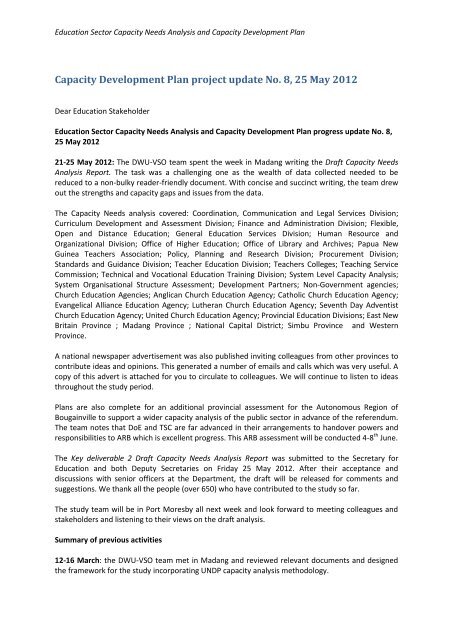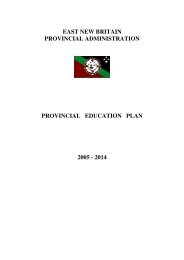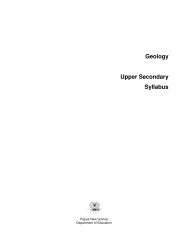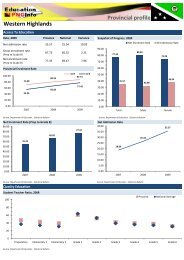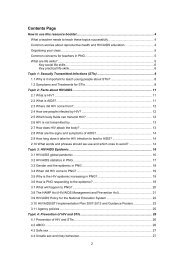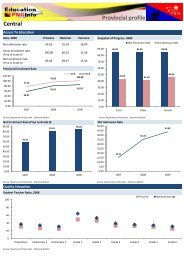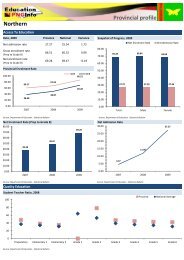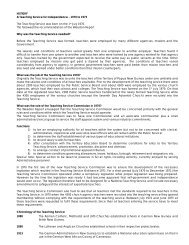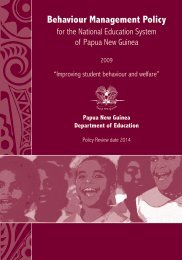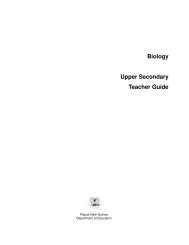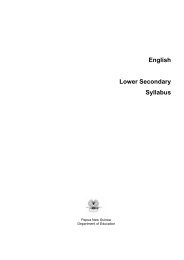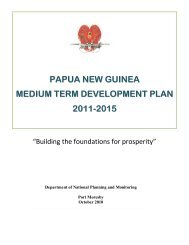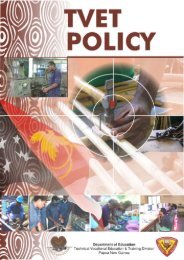Capacity Development Plan project update No. 8, 25 May 2012
Capacity Development Plan project update No. 8, 25 May 2012
Capacity Development Plan project update No. 8, 25 May 2012
- No tags were found...
You also want an ePaper? Increase the reach of your titles
YUMPU automatically turns print PDFs into web optimized ePapers that Google loves.
Education Sector <strong>Capacity</strong> Needs Analysis and <strong>Capacity</strong> <strong>Development</strong> <strong>Plan</strong><strong>Capacity</strong> <strong>Development</strong> <strong>Plan</strong> <strong>project</strong> <strong>update</strong> <strong>No</strong>. 8, <strong>25</strong> <strong>May</strong> <strong>2012</strong>Dear Education StakeholderEducation Sector <strong>Capacity</strong> Needs Analysis and <strong>Capacity</strong> <strong>Development</strong> <strong>Plan</strong> progress <strong>update</strong> <strong>No</strong>. 8,<strong>25</strong> <strong>May</strong> <strong>2012</strong>21-<strong>25</strong> <strong>May</strong> <strong>2012</strong>: The DWU-VSO team spent the week in Madang writing the Draft <strong>Capacity</strong> NeedsAnalysis Report. The task was a challenging one as the wealth of data collected needed to bereduced to a non-bulky reader-friendly document. With concise and succinct writing, the team drewout the strengths and capacity gaps and issues from the data.The <strong>Capacity</strong> Needs analysis covered: Coordination, Communication and Legal Services Division;Curriculum <strong>Development</strong> and Assessment Division; Finance and Administration Division; Flexible,Open and Distance Education; General Education Services Division; Human Resource andOrganizational Division; Office of Higher Education; Office of Library and Archives; Papua NewGuinea Teachers Association; Policy, <strong>Plan</strong>ning and Research Division; Procurement Division;Standards and Guidance Division; Teacher Education Division; Teachers Colleges; Teaching ServiceCommission; Technical and Vocational Education Training Division; System Level <strong>Capacity</strong> Analysis;System Organisational Structure Assessment; <strong>Development</strong> Partners; <strong>No</strong>n-Government agencies;Church Education Agencies; Anglican Church Education Agency; Catholic Church Education Agency;Evangelical Alliance Education Agency; Lutheran Church Education Agency; Seventh Day AdventistChurch Education Agency; United Church Education Agency; Provincial Education Divisions; East NewBritain Province ; Madang Province ; National Capital District; Simbu Province and WesternProvince.A national newspaper advertisement was also published inviting colleagues from other provinces tocontribute ideas and opinions. This generated a number of emails and calls which was very useful. Acopy of this advert is attached for you to circulate to colleagues. We will continue to listen to ideasthroughout the study period.<strong>Plan</strong>s are also complete for an additional provincial assessment for the Autonomous Region ofBougainville to support a wider capacity analysis of the public sector in advance of the referendum.The team notes that DoE and TSC are far advanced in their arrangements to handover powers andresponsibilities to ARB which is excellent progress. This ARB assessment will be conducted 4-8 th June.The Key deliverable 2 Draft <strong>Capacity</strong> Needs Analysis Report was submitted to the Secretary forEducation and both Deputy Secretaries on Friday <strong>25</strong> <strong>May</strong> <strong>2012</strong>. After their acceptance anddiscussions with senior officers at the Department, the draft will be released for comments andsuggestions. We thank all the people (over 650) who have contributed to the study so far.The study team will be in Port Moresby all next week and look forward to meeting colleagues andstakeholders and listening to their views on the draft analysis.Summary of previous activities12-16 March: the DWU-VSO team met in Madang and reviewed relevant documents and designedthe framework for the study incorporating UNDP capacity analysis methodology.
Education Sector <strong>Capacity</strong> Needs Analysis and <strong>Capacity</strong> <strong>Development</strong> <strong>Plan</strong>14 March: the <strong>Capacity</strong> <strong>Development</strong> Technical Working Group met at the Gateway Hotel anddetermined that the DWU-VSO team would write one <strong>Capacity</strong> <strong>Development</strong> <strong>Plan</strong> integratingrecommendations from the Ernst and Young Institutional Assessment report.19-23 March: familiarization discussions took place with senior DOE and AusAID officers including apresentation to the Top Management Team (TMT). The Key deliverable 1 Inception Report wassubmitted to the Secretary on Friday 23 March <strong>2012</strong>.27 March <strong>2012</strong>, TMT accepted the Inception Report which was Key Deliverable <strong>No</strong>. 1.26-30 March, R. Jones and C. <strong>No</strong>ngkas took advantage of the opportunity in Madang to meet withCatholic Education Principals, Regional Standards and Guidance Directors, and all Momase Provincialand District Education Advisers (DEAs). Also the team thanks PPR officers for collecting data fromIslands’ PEAs and DEAs in Kokopo.3 April: the team leader gave a brief <strong>update</strong> to the Top Management Team2-6 April: the DWU-VSO team conducted individual interviews with senior NDoE managers andnational stakeholders such as the Secretary, Deputy Secretaries, First Assistant Secretaries, AssistantSecretaries, national church education officers, Teaching Service Commission, Library and Archives,and partners in education AusAID, EU, JICA, United Nations, and World Bank.16-27 April <strong>2012</strong>: Two weeks of the data gathering at the national level in Port Moresby from staff,managers and superintendents of various divisions and organizations. Themes of capacity needsemerging from the data are: grooming leaders, housing, finance, coordination, communication,professional development, some restructuring, electronic management of data, and on-going ICTtraining for all staff.30 April to 4 <strong>May</strong> <strong>2012</strong>: Gathering data in the Madang Province. In addition to interviews and focusgroups in the Madang town, team members travelled to rural areas and gathered data from theUsino-Bundi District and Bogia District. Themes emerging from the data at the provincial level weresimilar to those at the national level. However themes emerging at the district level were verydifferent and included: non-receipt of education subsidies, inefficient procedures for accessingschool funds, inadequate planning for UBE, inadequate supplies of curriculum materials for studentnumbers, lack of clarity over charging <strong>project</strong> fees, borrowing positions from one school to another,professional development for members of Boards of Management, staff instability/high turnover,gender inequality, low levels of female student retention, and inadequacy of visits by agencyadvisers.7-11 <strong>May</strong> <strong>2012</strong>: The study team gathered data in the National Capital District and the SimbuProvince. Particular strengths of education in NCD were high numbers of women teachers, women inleadership roles, an ample supply of teachers to be employed, an English language media richenvironment, a strong tertiary sector and ease of access to services and supplies. Of greatestconcern in NCD were overcrowded classrooms with 70 to 80 students in a class; elementary classesbeing conducted outdoors as rooms were needed for increasing numbers of primary students; andinadequacy of classrooms, toilets and teaching and learning resources for increased studentnumbers. Housing, transport and safety issues for staff and students were also concerns.14-18 <strong>May</strong> <strong>2012</strong>: The DWU-VSO team visited East New Britain Province (Rabaul, Kokop, Gazelle) andWestern Province (Daru, Kiunga, Tabubil). A key feature of East New Britain was the impressive
Education Sector <strong>Capacity</strong> Needs Analysis and <strong>Capacity</strong> <strong>Development</strong> <strong>Plan</strong>number and strength of female leadership in schools. A key feature of Western Province was theinput to the education sector from mining industries. Otherwise capacity strengths and gaps weresimilar to those of other provinces. These were to be the last of the provincial visits. However, it hasbeen negotiated for two team members to visit the Autonomous Region of Bougainville 4-8 June toconduct a capacity needs analysis. This is linked to the transfer of powers from TSC and DOE to theARB in preparation for the referendum.Study Team for the <strong>Capacity</strong> <strong>Development</strong> <strong>Plan</strong>The DWU-VSO team is comprised of Professor Pam <strong>No</strong>rman (team leader), Mr Peter Baki, Mr RichardJones, Dr Catherine <strong>No</strong>ngkas and Mr Bill Oliver. This (<strong>25</strong> <strong>May</strong>) <strong>project</strong> <strong>update</strong> keeps you informed ofprogress.Further information: For further information you are invited to visit the <strong>project</strong> site on theDepartment of Education Internet site www.education.gov.pg or email studyteampng@gmail.com.Professor Pam <strong>No</strong>rman pnorman@dwu.ac.pg<strong>25</strong> <strong>May</strong> <strong>2012</strong>


